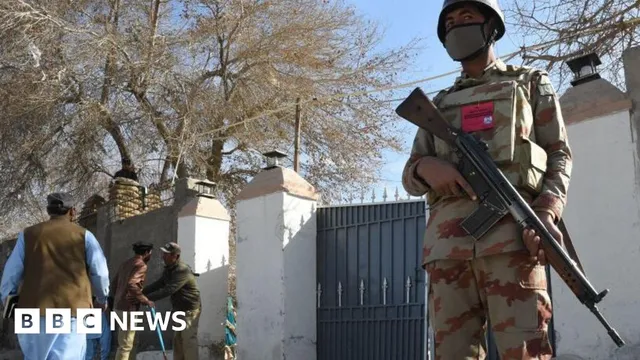
Suicide bomber kills children in attack on school bus in Pakistan
2025-05-23 12:43- A suicide bomber targeted a school bus in Khuzdar district, Balochistan, resulting in the death of at least four children and injuring 38 others.
- The attack underscores the deteriorating security situation in the region, which has been marred by acts of violence from various militant groups, including the Balochistan Liberation Army.
- The bombing has drawn widespread condemnation from officials and highlights the urgent need for increased security measures to protect children and educational institutions.
Express your sentiment!
Insights
On May 22, 2025, a tragic incident unfolded in Balochistan, a province in southwestern Pakistan, where a suicide car bomber targeted a school bus transporting children to a military-run institution in the district of Khuzdar. The bombing, which resulted in the deaths of at least four children and left 38 others wounded, highlights the ongoing security challenges facing the region, particularly due to the presence of various militant groups. As the attack took place, a local deputy commissioner named Yasir Iqbal reported that the bus was filled with students, raising concerns about their safety in a region experiencing heightened tensions. The area has long been plagued by violence and instability, primarily attributed to armed groups, including the Balochistan Liberation Army (BLA), which frequently engages in attacks targeting security forces and civilians. The incident attracted widespread condemnation from officials, including Pakistan's Interior Minister Mohsin Naqvi, who labeled the perpetrators as
Contexts
The history of the Balochistan insurgency is characterized by a complex interplay of ethnic, political, and economic factors, leading to prolonged unrest in the region. Balochistan, the largest province in Pakistan, has a significant population of ethnic Baloch people who have historically felt marginalized by the central government. The seeds of insurgency can be traced back to the period following Pakistan's independence in 1947 when Baloch leaders sought greater autonomy and rights but faced neglect and oppression. The situation grew tenser with resource exploitation, particularly after the discovery of vast natural gas reserves at Sui in the late 1950s, which fueled grievances regarding equitable distribution of wealth and development benefits for the local population. Thus, the initial insurgency began in the 1940s and 1950s, often sparked by feelings of political disenfranchisement and economic deprivation. Multiple insurgencies have erupted in Balochistan since the 1940s, each marked by varying objectives and levels of violence. The most significant conflicts commenced in the 1970s, particularly with the Balochistan conflict of 1973-1977, which was met with a military crackdown by the government. This cycle of repression and resistance persisted over subsequent decades, leading to the emergence of various militant groups, each with distinct ideologies and aims. These groups, such as the Baloch Liberation Army (BLA) and the Balochistan Liberation Front (BLF), have engaged in armed struggle against Pakistani state forces, often resulting in extensive human rights violations and displacement of local populations. In recent years, the insurgency has transformed, with younger factions adopting more radical approaches and increasing the frequency of attacks on military and state institutions. The insurgency has significant geopolitical implications, as Balochistan is strategically located with borders adjacent to Iran and Afghanistan. The region is also vital due to the China-Pakistan Economic Corridor (CPEC), which aims to connect Gwadar Port in Balochistan to the Chinese city of Kashgar. The presence of foreign investment and military assets has, therefore, fueled further tensions, inviting the ire of insurgent groups who perceive this as encroachment on their land and culture. The Pakistani government has attempted various strategies to address the insurgency, ranging from military operations to economic development initiatives. However, these efforts often stumble due to ongoing distrust between the Baloch people and the state, exacerbated by human rights abuses and political exclusion. As of 2023, the Balochistan insurgency continues to be a thorny issue for Pakistan, revealing the persistent challenges surrounding governance, ethnic identity, and resource management. Ongoing dialogue appears essential to address the underlying grievances of the Baloch population. Moreover, an emphasis on inclusive development and genuine political representation may pave the way for long-term stability in Balochistan. However, achieving these objectives necessitates a significant shift in approaches, moving from a purely militaristic response to a framework focused on reconciliation and sustainable development, which remains a formidable challenge given the entrenched positions of various stakeholders.